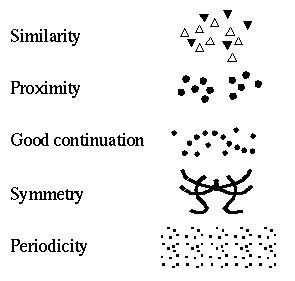Plato's Cave: Gestalt Laws
The Gestalt Laws of Perceptual Grouping
Objects in a scene appear to group preattentively according to
certain laws or principles, including:

- Similarity:
Objects with similar properties (e.g. shape, color)
- Proximity:
Nearby objects
- Good Continuation:
Objects that define smooth lines or curves
- Symmetry:
Objects that form symmetrical patterns
- Periodicity:
Objects that form periodic patterns
Attneave proposed that the Gestalt grouping laws represent repetition
or redundancy in the visual world, which provide an opportunity for
information compression,
and that this was the purpose of the Gestalt grouping laws.
For example Attneave showed that a picture of a cat can be simplified
by replacing all lines of low curvature with straight lines, as shown
below, without adversely affecting the recognizability of the cat. In
other words, the lines of low curvature represent redundant
information, which therefore need not be explicitly stored in
memory.
Biederman gives further evidence for this notion by showing that a cup
remains recognizable after removal of its lines of low curvature,
whereas it becomes unrecognizable after removal of its points of high
curvature and line intersections.

Return to argument
Return to Steve Lehar


